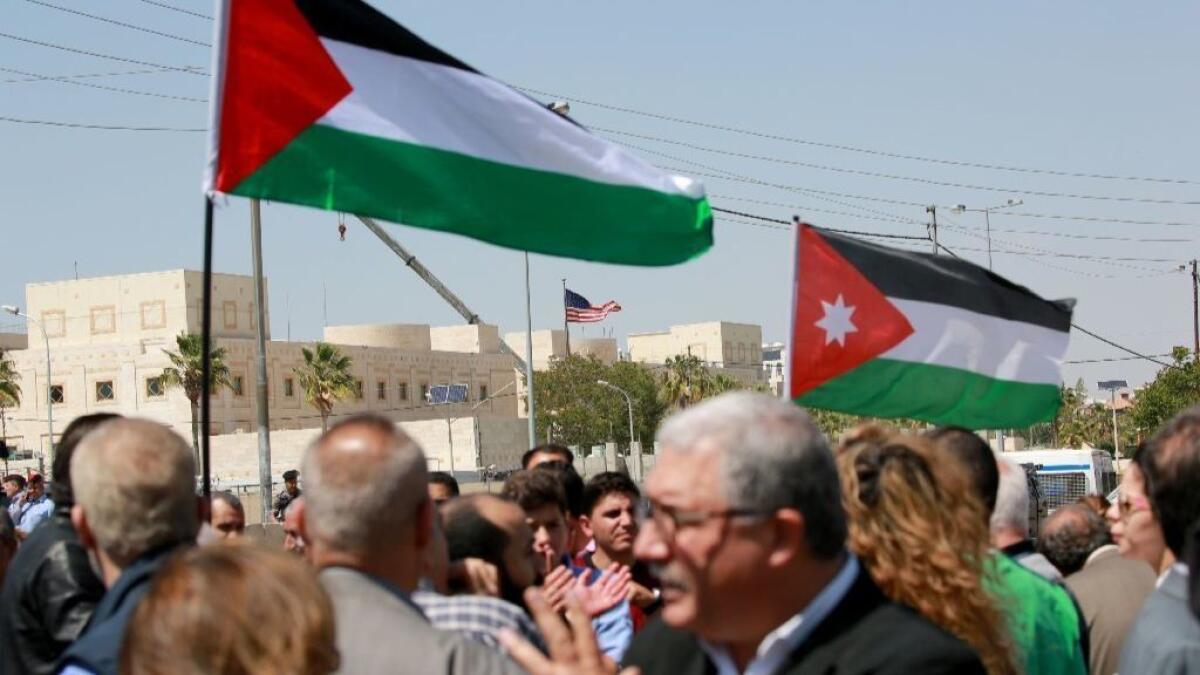Trump declares ‘Mission Accomplished!’ in Syria airstrikes

- Share via
Reporting from Washington — President Trump declared, “Mission Accomplished!” on Saturday after the U.S. and its allies hit at least three chemical and biological weapons facilities in Syria with more than 120 missiles in a coordinated pre-dawn attack.
“A perfectly executed strike,” Trump said on Twitter, even as top Pentagon officials said they still were assessing the damage.
The military officials said they were confident that Syrian government installations that produced chlorine gas and sarin, a nerve agent, were destroyed or damaged.
The Pentagon said it knew of no civilian casualties “at this time.”
Russia angrily accused Britain, France and the U.S., the three nations involved in the airstrikes — all permanent members of the United Nations Security Council — of committing a “military crime” and convened an emergency session of the Security Council, the fifth this week.
Trump’s declaration of “mission accomplished” had an awkward historic ring. It famously was on a backdrop banner when President George W. Bush stood on the deck of an aircraft carrier in May 2003 and prematurely declared victory in Iraq. The U.S. war there dragged on for eight more years.
Defense Secretary James N. Mattis told reporters Friday night that the administration still did not know whether a Syrian attack on a rebel-held area near Damascus last Saturday involved an illegal nerve agent as well as chlorine. The U.S. and other Western powers have blamed the suspected gas attack on Syrian President Bashar Assad, who is backed by Russia and Iran.
At the Security Council meeting in New York, Russian ambassador Vassily Nebenzia said that Russian and Syrian forces are attacking terrorists, not civilians, and that overnight attack by the U.S. and its European allies had worsened an “already catastrophic humanitarian situation.”
Nebenzia accused the U.S., France and Britain of committing illegal “acts of aggression” by attacking without U.N. approval.
Nikki Haley, the U.S. ambassador to the U.N., countered that Russia’s track record of vetoing Security Council resolutions designed to rein in the Assad government had given the Syrian leader “a green light” for the use of “barbaric weapons.”
Haley said the airstrikes did not change U.S. strategy in Syria. The Trump administration has never articulated its strategy or goal in Syria beyond fighting Islamic State militants and calling for political negotiations to replace Assad.
She said Trump was “locked and loaded” to order more airstrikes if Assad conducts another poison gas attack.
Most members of the Security Council, with the notable exception of Bolivia, voiced support for the airstrikes.
British Prime Minister Theresa May said in London that the West had tried “every possible” diplomatic means to stop Assad from using chemical weapons.”
“But our efforts have been repeatedly thwarted” by Syria and Russia, she said.
In Syria, government supporters appeared relieved that the airstrikes were not more extensive.
While the Pentagon claimed the missile barrage hit their targets and would cripple Assad’s ability to develop, produce or deploy chemical or biological weapons, the long-term impact was less clear.
“These limited strikes may serve to deter future chemical weapons use, but assuming they don’t trigger escalation or a retaliation, they won’t dramatically alter the course of the conflict,” Emma Beals, a Beirut-based expert who has been monitoring the war in Syria, said on Twitter.
For more on international affairs, follow @TracyKWilkinson on Twitter
UPDATES:
10:05 a.m.: This article was updated with details from the U.N. Security Council.
This article was originally published at 7:35 a.m.
More to Read
Get the L.A. Times Politics newsletter
Deeply reported insights into legislation, politics and policy from Sacramento, Washington and beyond. In your inbox twice per week.
You may occasionally receive promotional content from the Los Angeles Times.











